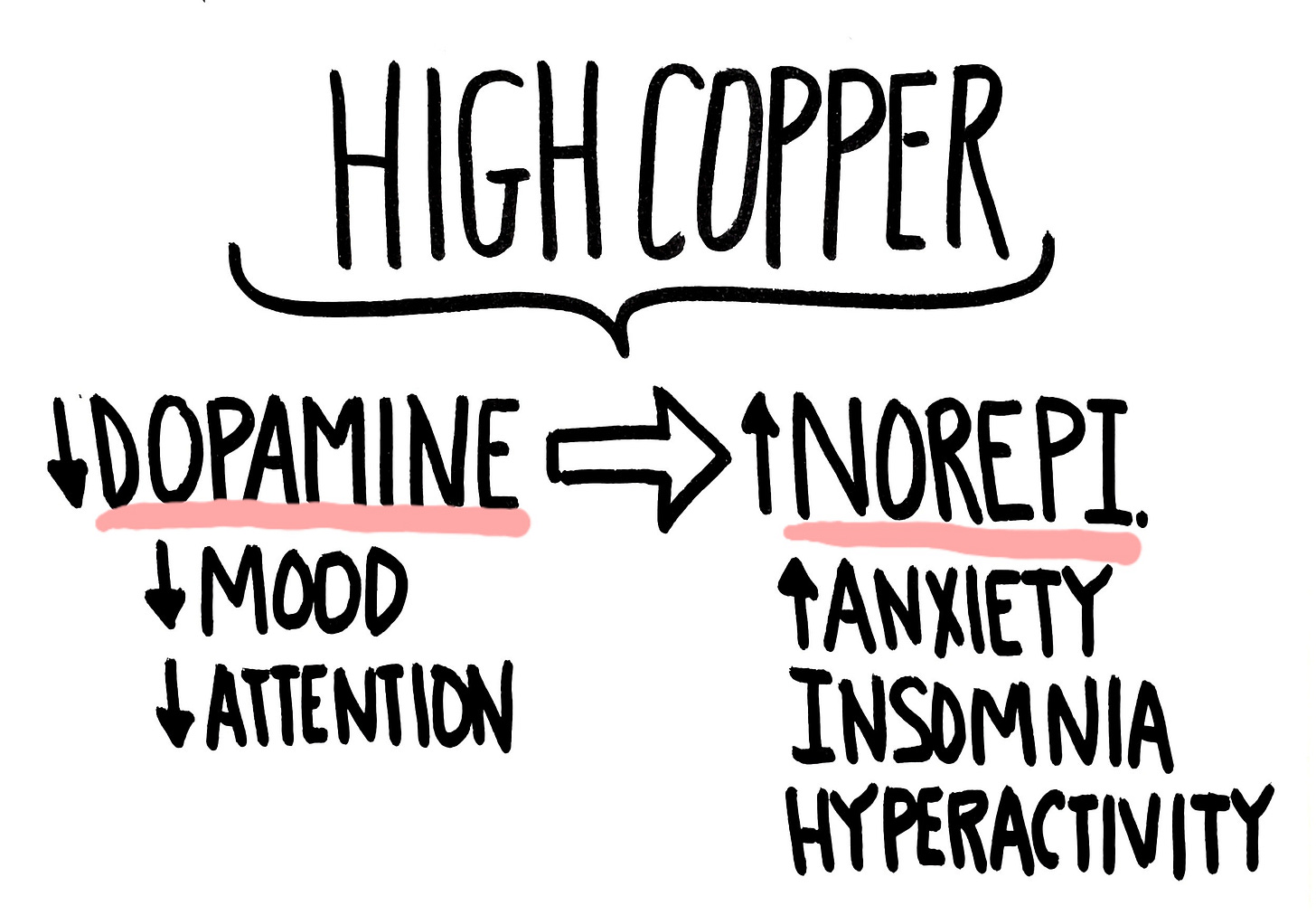High Copper Causes & Conditions
10 Situations to Consider Copper...Tantrums/Rage, ADHD, Postpartum Depression, Panic & More
I’m always glad to share about high copper - both what I’ve learned from Dr. William Walsh, PhD and from my own clinical experience. Copper overload is a common driver when it comes to brain symptoms. It is not difficult to treat and addressing it can usually have a big impact on someone’s life and the lives of those around them. Though I’ve shared about copper in a previous blog post and podcast episode, in this newsletter, I’ll highlight conditions or situations when I suspect high copper. Because copper overload is often not occurring in isolation, this is also a nice opportunity to show how it can interact with other root causes.
How Does Copper Impact Brain Symptoms?
Copper is a trace metal that exists in our body. It is a cofactor in the conversion of dopamine to norepinephrine, meaning the enzyme that converts dopamine to norepinephrine needs copper to work well.
Too much copper means too much conversion; too much conversion means a depletion of dopamine (needed for mood and attention) and too much norepinephrine (think adrenaline and difficulty feeling calm). That combination can cause a range of symptoms. Those with high copper don’t necessarily have all of the possible symptoms.
Why Would Copper Be High?
First - from a source such as a copper IUD, copper containing supplements, or a lot of high copper foods - chocolate and shellfish are especially high. Copper is in the water supply, but it is especially high in well water.
Second - added estrogen in the form of birth control or hormone replacement, but also hormonal events in one’s life, such as pregnancy or even puberty. Copper is needed to vascularize - make blood vessels for the placenta. Estrogen and thus copper levels will naturally go up during pregnancy, but then should come down. For some women, copper level's don’t come down enough. This may be due to a genetic vulnerability.
Third - genetic variant (snp) that impacts metallothionine proteins. Though lesser known, these are incredibly important antioxidants in the body. They are proteins that regulate copper and zinc, play an important role in protecting us from toxins, and provide protection at the blood gut and blood brain barrier.
Fourth - high oxidative stress - this is when our body’s antioxidants are getting used up - depleted by some overwhelming stressor on the body - toxicity from biotoxin (often mold) toxic chemicals, heavy metals, inflammation, trauma, etc. If metallothioneins, for example, are busy dealing with toxicity, they won’t keep copper levels in check. To do their job, they need zinc (itself an important antioxidant). This brings us to the…
Fifth - low zinc - this again, could be due to oxidative stress, but it can also be a result of high pyrroles. Insufficient dietary sources can also be a factor.
10 Situations to Consider High Copper
High copper and its consequences can occur at any age. Despite copper common relationship with estrogen, boys and men can also be effective. Copper overload is often occuring with other root causes.
Children, teens or adults with severe tantrums, rage or a diagnosis of mood dysregulation disorder or intermittent explosive disorder. Usually these types of symptoms are due to high copper and/or high pyrroles. As Dr. Walsh has always said, one of the easiest conditions to treat with a nutrient protocol are severe tantrums in children.
Those with ADHD. When the Walsh Research Institute looked at 5600 children and adults with ADHD, 68% were found to have a copper zinc imbalance (depressed zinc and elevated copper). When you look at the combination of low dopamine (decreased attention) and high norepinephrine (hyperactivity), this makes sense.
Girls with a new onset of depression, anxiety or attentional issues around puberty. This may also relate to a slow COMT being futher slowed by estrogen.
Any teen or woman who has a worsening of mood, increased anxiety or decreased attention after starting oral contraceptives or hormone replacement. Often teen girls or young women, who have had heavy bleeding (and/or brain symptoms) related to their cycle, are started on oral contraceptives to help their symptoms. If they are coming to see me, it is because of new or escalating brain symptoms. My expectation is that they had high copper to begin with and that it has become higher over time from the added estrogen.
Any woman with brain symptoms and a copper IUD. Though not all women have problems regulating copper, some do (or already have high copper before a copper IUD could make it go higher). Any research suggesting a copper IUD is safe isn’t accounting for our biochemical diversity. Maybe someday there will be a standard of care that requires serum copper levels to be tested before a copper IUD (or even birth control pills) and at least one follow-up test.
Any woman with a history of postpartum depression, anxiety or psychosis - Research by Dr. William Walsh found that 95% of women who reported having had postpartum depression, had high copper. Copper levels go up during pregnancy, but should return to normal pre-pregnancy levels after birth. If a woman has difficulty regulating copper, it can stay high and contribute to postpartum symptoms.
Anyone with panic. This could also be related to overmethylation, slow COMT and/or MAOA and/or mast cell activation.
Those on the autism spectrum. They tend to have very high oxidative stress (their protective antioxidants have become depleted usually due to toxicity, genetic vulnerabilities and inflammation) and because of this, they usually have low zinc, elevated copper.
Anyone else with a severe brain condition including Alzheimers, Parkinson’s, paranoid schizophrenia or bipolar disorder. As with autism these individuals are dealing with severe oxidative stress. Another factor for high copper in dementia and Parkinson’s disease may also relate to the fact that our zinc levels decrease as we age. As zinc drops, copper goes up. The good news is, zinc can be optimized as we age.
Anyone with a family history with anger or temper issues, ADHD, postpartum depression.
In next weeks newletter, I’ll address testing, and answer, “Why if copper overload is so common is it so rarely identified?” I’ll also discuss treatment considerations.
Until then, I’d love to read any of your questions or thoughts about copper.
Wishing you a Thanksgiving filled with peace, gratitude, connection (…and if needed healthy boundaries).
Thank you for your ongoing interest and support of this newsletter,
Courtney
P.S. Paid subscribers look out for this weeks upcoming post where I’ll be sharing case examples of copper overload with sample lab testing and interpretation.
Medical Disclaimer:
This podcast is for educational purposes and not intended or implied to be a substitute for professional medical advice, diagnosis or treatment for either yourself or others, including but not limited to patients that you are treating (if you are a practitioner). Consult your own physician for any medical issues that you may be having.








Incredibly clear, and answered SO many questions about my family's health!! Thank you for sharing your insightful expertise with us!
Thank you Dr Snyder. Two questions. How does endogenous estrogen increase copper? And where can I find Dr Walsh work?